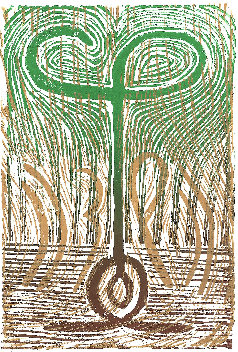Mark Hurvitz
דוקא/DAVKA (the journal) Vol. II No. 2 March-April 1972 — “JESUS?”
The growing Jesus movement among American youth is a phenomenon that has tremendous implications for world Jewry. Young Jews are being approached on American college campuses by people who attempt to convert them to Christianity. Many of these students have weak Jewish self-images, the result, in part, of a recognized lack in the Jewish educational system, and some may be easily swayed by the facile arguments and scriptural quotations of those who accost them. The perennial crisis faced by young Jews on the campuses is a national question requiring a decision between two identities, that of an assimilated American Jew and an independent cultural/national Jew. Now a new dimension has been added, the theological, and identity crisis for some of those people who are still unsure of themselves is one of a decision between popular Christianity and any of the current forms of popular Judaism. The majority of Jewish youth have had no experience on the metaphysical turf with its terms and tactics, and the arguments of the Jesus-freaks are often accepted because of the self-assurance of the challengers and the simplicity of the solution offered.
Some young American Jews have accepted Jesus as the messiah. Many of these people are the most active proselytizers on the campuses, but there are also young Jewish Israelis, olim, and sabras, who believe that Jesus is the messiah. The question should be asked if a distinction can be made between these two groups of “Hebrew Christians” (“Completed Jews,” “Messianic Jews,” and “Biblical Jews”), who (1) live their lives without a part in the continuity of the Jewish communities in the Diaspora, and those who (2) maintain a non-normative Jewish belief while being responsible members of the Jewish society of Israel. The comparison can be made between the Gentile Church and the Jerusalem Church at the time of the destruction of the Second Commonwealth. Many adherents of Rabbinic Judaism would deny the validity of both of these trends as remaining within the Jewish fold.
There are other, possibly more serious, implications of this new American movement. Many young Christians are going to Israel to experience “His Land” (the title of an Israel travelogue by Billy Graham). These Christians speak of the “Second Coming” and announce it with their bumper stickers. Fundamentalist tracts are being published with increasing frequency which identify current events in the Middle East as those preparing for the “Latter Days” of the Christian Testament prophecy.
We may also ask whether these messianic expectations are related to other Christian eschatological projections which will be fulfilled when we (the Jews) return to our (“The Holy”) Land. Further questions deal with the political ramifications of these beliefs held by some Christians and whether these beliefs are reflected in the changing flow of American armaments to Israel in anticipation of the Christian Armaggedon [sic] (final battle of total destruction to take place at Maggido [sic]). On the other side of this political issue the questions become more personal for Jews: Do some Christians expect Israeli soldiers to fight a theological crusade in proxy for them, and is the Israeli leadership unwittingly cooperating with this Christian game? There are Jewish messianic aspects implicit in the ideology and goals of political Zionism as well which should be examined along with the questions raised above. What is the contemporary political meaning of the Jewish “Kingdom of God” with Israel as the “nation of priests” when “out of Zion shall go forth the Law”? The current situation with its discussions of apocalyptic expectations does not offer the Jewish community the option of avoiding these topics—davka, they should be approached head-on.
It is as a sober introduction to this world of youth involvement with theological speculation that this issue of Davka has been prepared. Included are analyses of the messianic concept in Judaism, of the historical Jesus, and an example of a medieval Jewish polemic against Christianity. Also found in this issue, from a more contemporary approach, is an essay analyzing popular Christianity through its creative expressions, and a poetic exploration of Jesus as a Jewish mystical symbol.
We hope that the issues presented here will encourage an in-depth discussion of the effects of this development in American Christianity and on the world of Jewry.

